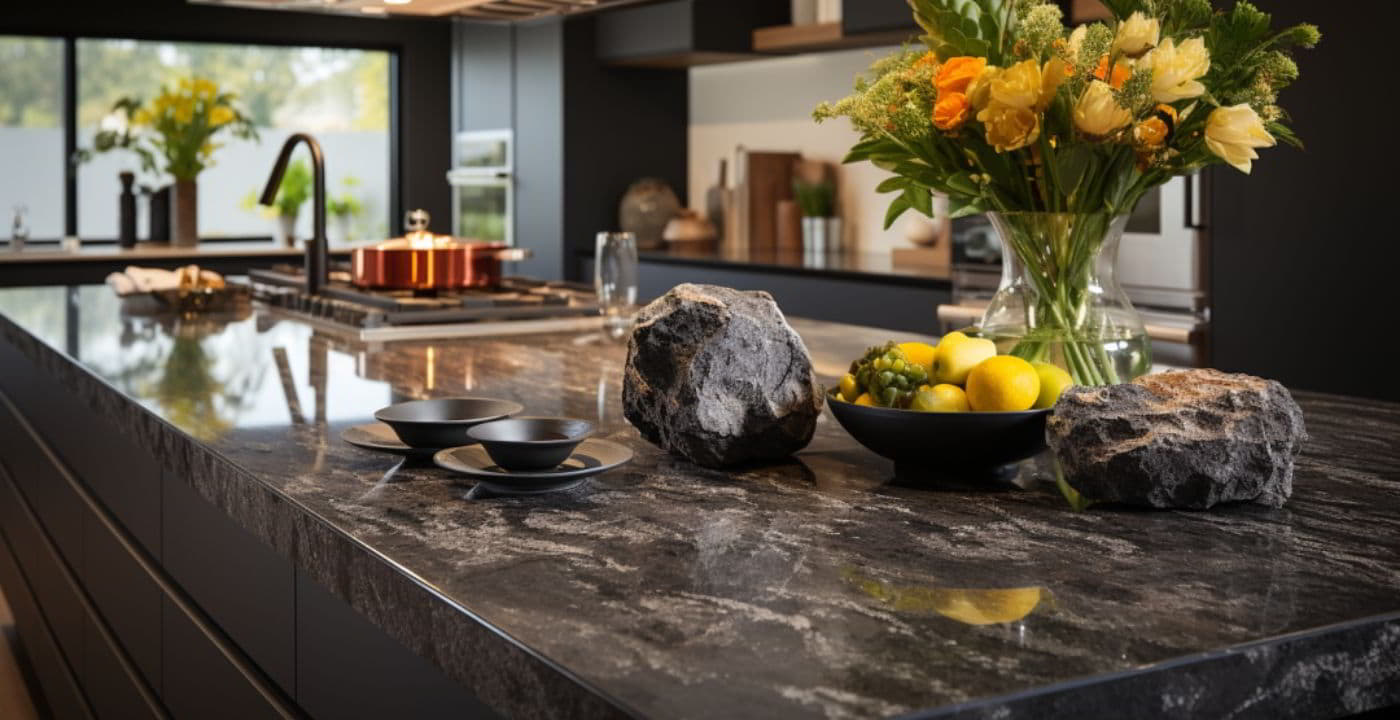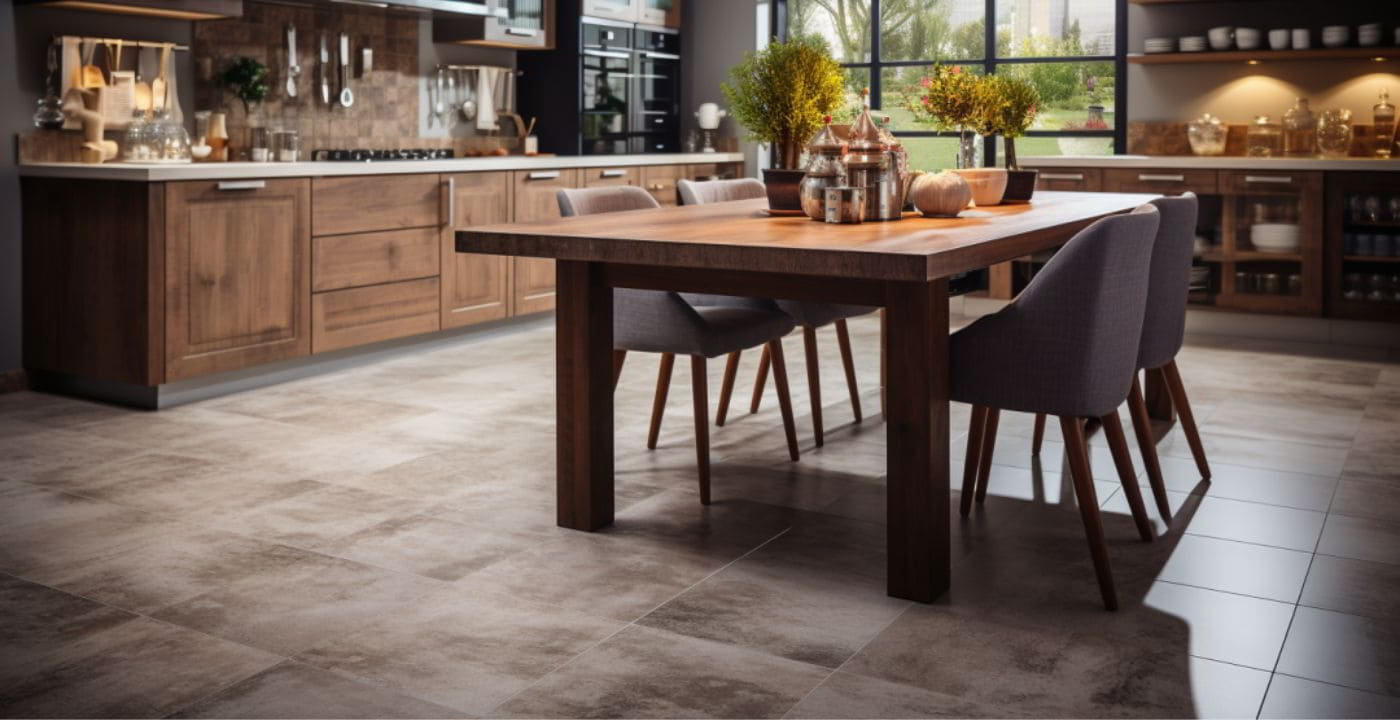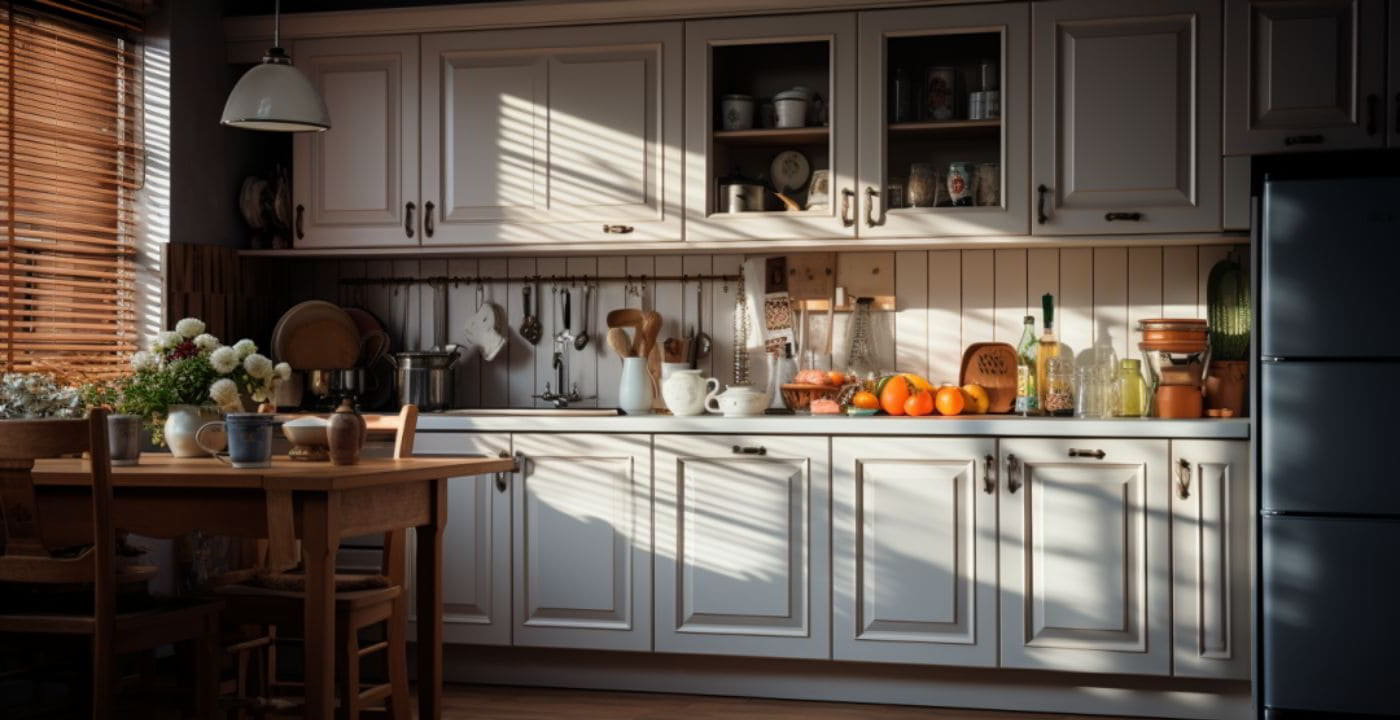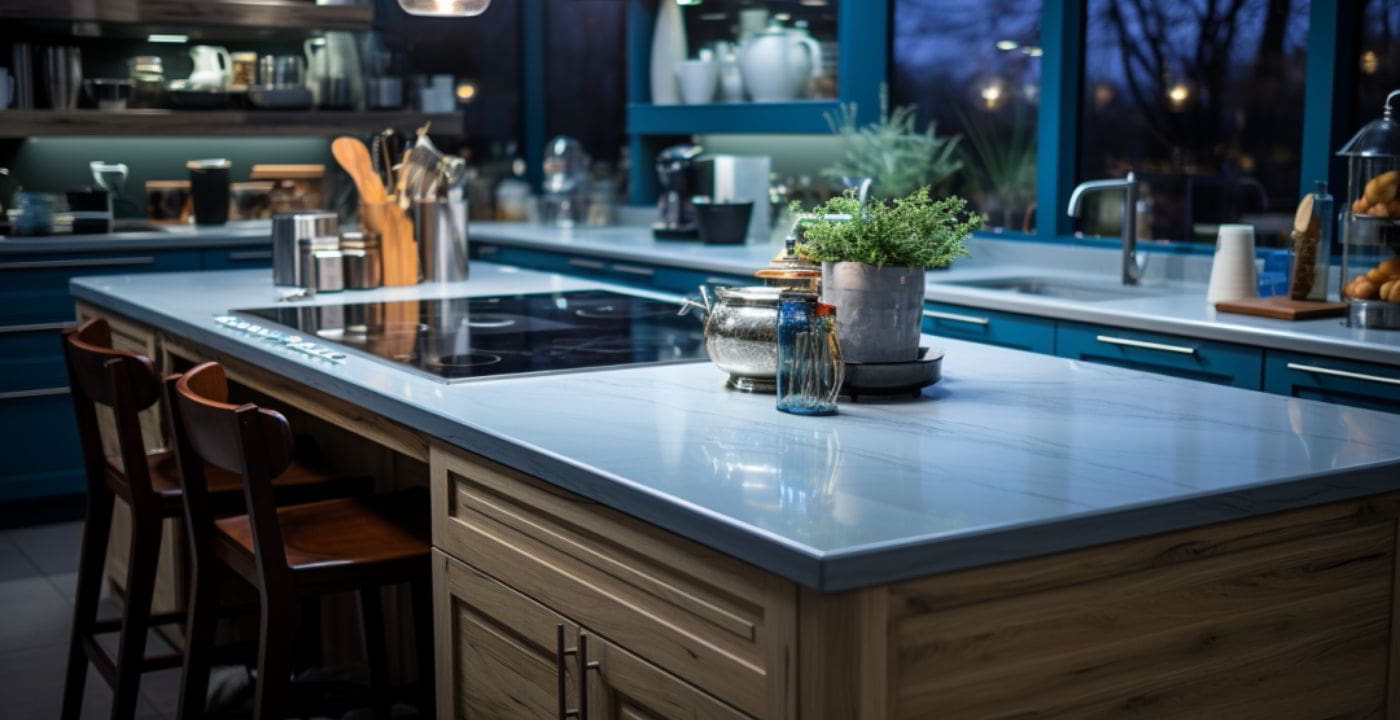Granite vs quartz: two heavyweights battling for kitchen supremacy.
But deciding between granite’s beautiful patterns and quartz’s sleek look doesn’t have to be a stone-cold dilemma.
We’ll discuss all the details, from pricing and design choices to maintenance and longevity to help you pick the perfect countertops for your kitchen.
Ready for a revamp?
Key Notes
- Granite offers superior durability and heat resistance, making it ideal for busy, high-traffic kitchens.
- Marble requires sealing every few months, whilst granite needs just annual maintenance.
- Premium marble starts at £70/sq ft, whilst granite begins at £50/sq ft for basic varieties.
- Light-coloured granite makes spaces appear larger and better hides everyday wear and tear.
Granite vs Quartz: Which Is Better For Your Kitchen Worktops?
Choosing the right worktop material is a big decision when designing or renovating your kitchen.
If you’re torn between granite vs quartz, the choice often boils down to personal preference, practicality, and budget.
Both materials have their merits, but understanding their differences will help you decide what fits your kitchen and lifestyle best.
Here’s a quick overview:
| Feature | Granite | Quartz |
|---|---|---|
| Price Range | £40-£200 per square foot | £50-£150 per square foot |
| Durability | Durable but can chip | Extremely durable, resistant to chipping |
| Maintenance | Needs sealing periodically | No sealing required, low maintenance |
| Design Variety | Natural patterns, unique per slab | Uniform, customizable patterns |
| Eco-Friendliness | 100% natural, requires quarrying | Engineered, sometimes includes recycled materials |
What Is Granite?
Choosing the right worktop material is a big decision when designing or renovating your kitchen.
If you’re torn between granite vs quartz, the choice often boils down to personal preference, practicality, and budget.
Both materials have their merits, but understanding their differences will help you decide what fits your kitchen and lifestyle best.
Here’s a quick overview:
Granite is one of the oldest materials used by humans, with some countertops made from stone formed over 300 million years ago.
Each slab is unique, with varying patterns and colours. Its organic look and tough composition make it a go-to for anyone wanting timeless charm in their kitchen.
Pros of Granite Countertops
1. Heat Resistance
Granite withstands high temperatures which means it’s safe to place a hot pan on it without worrying about damage.
This makes it ideal if you’re an avid home chef who enjoys cooking up a storm in your kitchen.
2. Durability
When it comes to kitchen countertops, granite is one of the hardest materials available. It resists scratches and can handle daily wear and tear with ease.
3. Natural Beauty
Each slab of granite has a unique appearance. If you’re looking for something one-of-a-kind that adds character to your kitchen, granite is a strong contender.
Disadvantages of Granite Countertops
1. Porosity
Granite is naturally porous, so you need to seal it every year or two to protect your countertops from stains and bacteria. Spilled liquids like wine or oil can seep in if not cleaned promptly.
2. Cost
If you’re going for top-of-the-range premium granite then expect it to be pricy. Costs also increase if you want rare patterns or colours.
3. Weight
Granite is heavy so you’ll need sturdy cabinets to support it during installation.
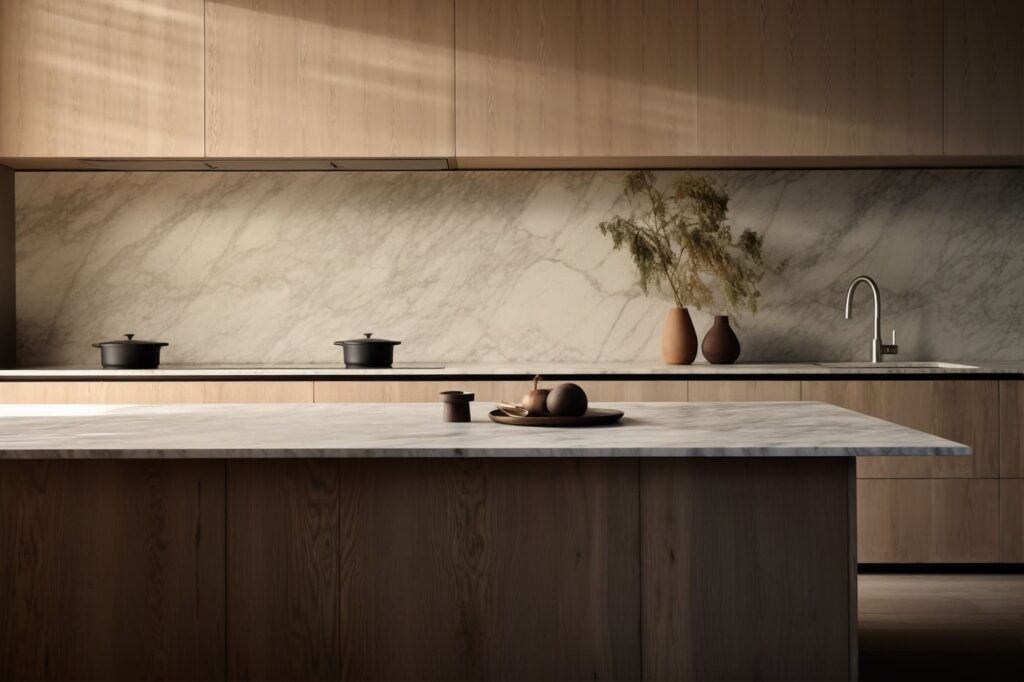
What Is Quartz?
Quartz countertops are engineered stone surfaces. They are made by combining natural quartz crystals with resins and pigments.
This process creates a durable, non-porous material that looks like natural stone while offering additional benefits.
Pros of Quartz Countertops
1. Non-Porous Surface
Quartz doesn’t need sealing, which makes it resistant to stains, bacteria, and mould. It’s an excellent choice for busy households.
2. Customizable Designs
Unlike granite, quartz worktops are available in a wide range of patterns and colours.
From sleek modern aesthetics to designs resembling natural stone, quartz has something for everyone.
3. Low Maintenance
A simple wipe with warm water and mild soap is all you need to keep quartz looking pristine.
Disadvantages of Quartz Countertops
Quartz isn’t perfect either. Here are some of the disadvantages you should be aware of:
1. Heat Sensitivity
Extreme heat can damage quartz countertops. Always use trivets or heat-resistant pads for hot pans.
2. Price
While competitive with granite, custom quartz designs or premium brands can push the price higher.
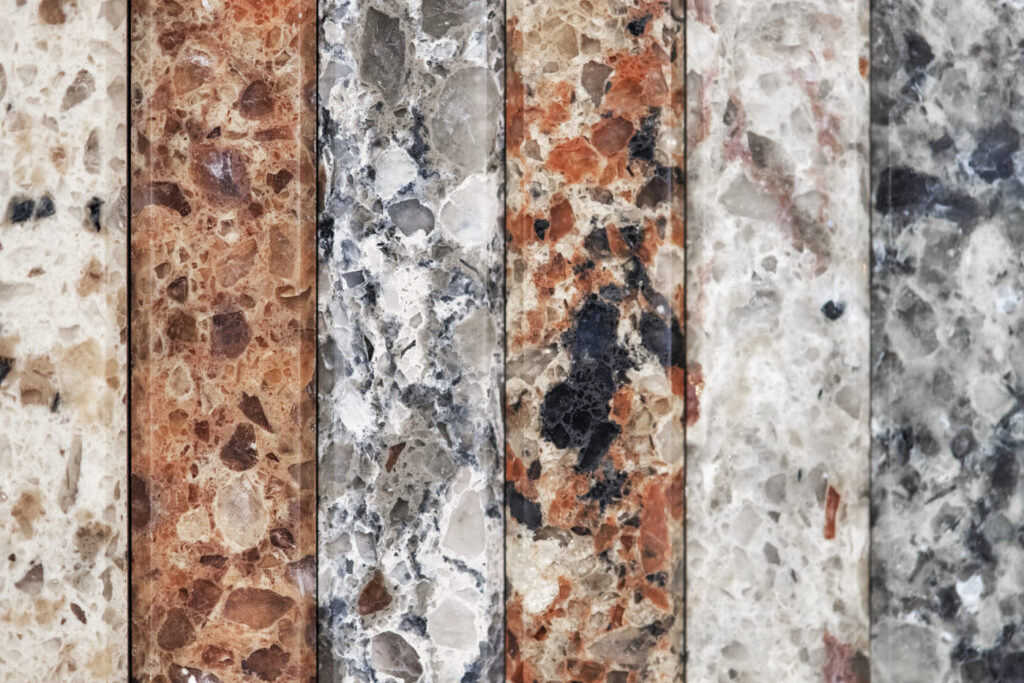
Granite vs Quartz: Key Comparisons
| Feature | Granite | Quartz |
|---|---|---|
| Stain Resistance | Requires sealing to prevent stains | Naturally stain-resistant |
| Heat Resistance | Highly resistant to heat | Sensitive to heat |
| Aesthetic Appeal | Unique, natural patterns | Customizable and uniform |
| Longevity | Decades with proper care | Equally long-lasting with minimal upkeep |
ℹ️ Pro Tip: Go for lighter-coloured granite or quartz countertops to brighten up your space if your kitchen has limited natural light.
Granite vs Quartz Price
Granite prices start at around £40 per square foot for basic options, going up to £200 for rare and exotic patterns.
Quartz prices range from around £50 to £150 per square foot, depending on the brand and level of customization.
While granite can be more expensive at the high end, quartz often provides better value for its practicality and design consistency.
Which Is Better: Quartz or Granite?
The answer depends on your lifestyle, kitchen habits, and design preferences.
Choose granite if:
- You love the natural look of stone with unique patterns.
- You don’t mind regular maintenance like sealing.
- Heat resistance is important to you.
Choose quartz if:
- You prefer a low-maintenance option that’s easy to clean.
- You want a worktop with a uniform, modern design.
- Stain resistance is a must-have in your kitchen.
How to Decide: Granite vs Quartz Countertops
When making your choice, think about what matters most to you:
- Aesthetics: If unique, natural beauty speaks to you, granite is your answer. But if you want sleek, modern consistency, quartz fits the bill.
- Maintenance: Do you want hassle-free cleaning? Quartz needs less upkeep.
- Durability: Both are durable, but granite edges out in heat resistance, while quartz leads in stain resistance.
Frequently Asked Questions
What are the pros and cons of granite vs quartz?
Granite offers heat resistance, natural beauty, and durability, but it requires regular sealing and can be costly. Quartz provides stain resistance, easy upkeep, and customizable designs, but it’s heat-sensitive and less natural in composition.
What is the best material for a countertop?
Both granite and quartz are excellent choices. Granite suits those who value natural beauty and heat resistance, while quartz appeals to homeowners seeking low-maintenance surfaces and modern designs.
What is the downside of quartz countertops?
Heat sensitivity is the biggest drawback. Prolonged exposure to high temperatures can cause discoloration or cracking, so using trivets is essential.
What is the downside to granite countertops?
Granite requires sealing to protect against stains and bacteria. Additionally, its weight can be a challenge during installation, and it may chip or crack if struck with heavy objects.
What is the difference between granite and quartz?
Granite is a natural stone, while quartz is engineered using natural quartz crystals and resins. Granite offers unique patterns, whereas quartz provides uniformity and a non-porous surface.
Conclusion
Kitchen countertops aren’t just surfaces – they’re the heartbeat of your culinary space.
When debating between granite and quartz, you’ve got granite’s natural swagger or quartz’s sleek precision, with both bringing serious style and durability to your home.
But why wrestle with this decision alone? We’ll assist you through your renovation from start to finish. Get in touch with us and explore kitchen countertop options tailored to your style and budget.

